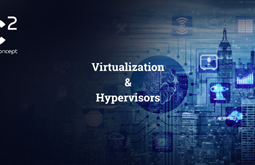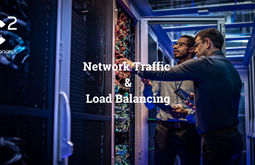

CLOUD CONCEPT
Νερατζιωτίσσης 15, Μαρούσι, Αθήνα, 15124, Αττική
+30 210 600 7072
info@c2.gr
Hybrid Cloud for High-Performance Computing (HPC)
Hybrid Cloud for High-Performance Computing (HPC)

Hybrid Cloud offers a flexible way to combine on-premises infrastructure with the scalability of public cloud resources, enabling businesses to maximize HPC (High-Performance Computing) performance without the challenges and costs associated with a fully on-premise solution. HPC is essential for companies working with large data processing, AI, simulations, and other compute-intensive applications.
Benefits of Hybrid Cloud for HPC
Using Hybrid Cloud for HPC provides several strategic advantages for high-performance applications:
1. Flexibility and Scalability: The ability to combine on-premises infrastructure with cloud computing power allows companies to scale according to the requirements of each project. This flexibility is especially critical for AI applications and big data analytics, where the ability to move workloads between on-premises and cloud environments ensures efficient resource utilization.
2. Cost Efficiency: Cloud-based HPC resources offer a pay-as-you-go model, reducing the need for expensive hardware investments for periodic or temporary compute power needs. Companies can leverage the public cloud for peak workloads while maintaining consistent, predictable demands on their on-premises infrastructure.
3. Resource Optimization with Low Latency: The hybrid model allows businesses to leverage local infrastructure for critical, latency-sensitive applications, while utilizing cloud computing power for workloads that require larger scalability.
Key Implementation Strategies
To effectively use Hybrid Cloud in HPC, we recommend the following strategies for efficient resource management and optimal infrastructure utilization:
1. Data and Networking Management
Managing data traffic between on-premises and cloud infrastructure is essential for the success of the hybrid cloud model. Particularly for HPC workloads, where large datasets are frequently moved, companies must ensure high-speed, reliable networks to reduce latency and data loss. Integrating technologies such as SDN and VPN is crucial to achieving these objectives.
2. Hybrid Infrastructure and Orchestration
Utilizing orchestration tools like Kubernetes allows businesses to automate and manage hybrid cloud environments, integrating on-premises infrastructure with public cloud services. This is vital for balancing HPC resources and enhancing scaling efficiency.
3. Security and Compliance Policies
Implementing robust security and compliance policies in hybrid cloud environments is essential to protect data and HPC applications. This includes applying data encryption, monitoring network traffic, and ensuring that public cloud resources comply with industry regulations and business requirements.
Success Factors
Despite the obvious benefits of Hybrid Cloud for HPC, several challenges must be addressed to ensure successful implementation. Continuous performance monitoring, network constraint management, and infrastructure alignment are critical factors in achieving optimal performance. Additionally, businesses must ensure ongoing training for their teams to fully leverage the capabilities of the hybrid cloud.
For organizations requiring high computational capacity for HPC workloads, adopting a Hybrid Cloud model provides a powerful strategy for achieving flexibility, scalability, and cost reduction. With proper resource management, the integration of appropriate orchestration tools, and continuous performance monitoring, companies can maximize the performance of their HPC applications, regardless of the scale and data requirements.
Στην Cloud Concept στόχο αποτελεί η αδιάλειπτη τεχνική υποστήριξη των αναγκών σας, η προσφορά managed υπηρεσιών υψηλού επιπέδου και η παροχή πρόσβασης σε χρήσιμες προτάσεις για την αποδοτική διαχείριση των δεδομένων σας.
Ακολουθήστε μας σε LinkedIn, Facebook & Instagram ή εγγραφείτε στο Newsletter μας, για να μένετε ενημερωμένοι!
σχετικά άρθρα
Πρόσφατες αναρτήσεις
-

Cloudflare Outage on November 18, 2025 – What Happened & What You Should Know
-

Harness the power of Quantum Computing through Cloud Hosting
-

AI and Predictive Analytics for Cloud Cost Optimization
-

Observability in Cloud Hosting: How to Set Up Monitoring for Cloud-Native Apps with Prometheus and Grafana
-

Hybrid Cloud for High-Performance Computing (HPC)
Κατηγορίες
- Όλες οι κατηγορίες
- Announcements
- Ansible
- Apache
- Automation
- Blogc
- Caching
- Coorporate
- Debian
- Development
- Dns
- Docker
- Firewall
- Git
- Hosting
- Installation Guides
- Java
- Let's encrypt
- Linux basics
- Load balancing
- Load testing
- Miscellaneous
- Monitoring
- MySQL
- Network Issues
- Networking
- Nginx
- Php
- SSL
- Security
- Solr
- Vpn

























































































































